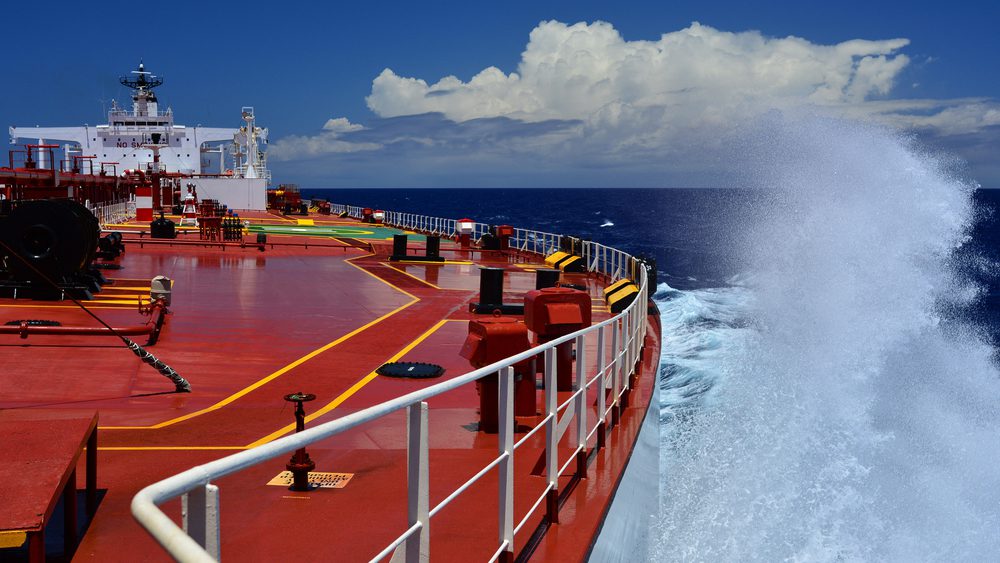Iranian Ship Linked to Houthi Attacks Heads Home Amid Tensions
(Bloomberg) — An Iranian ship that’s been linked to Houthi attacks in the Red Sea is returning home, removing a prominent asset in the area as the Islamic Republic braces...


Photo: By G-Valeriy / Shutterstock
By Laura Blewitt and Amy Stillman (Bloomberg) — Mexico is scouring the earth to stock up on diesel fuel before market-liberalization measures take effect.
Petroleos Mexicanos, the country’s state-run oil company, has been on a buying spree of about a tanker load of diesel a day from the U.S. alone this year and recently purchased it as far afield as the United Arab Emirates and China. Mexico is set to lift price limits on the fuel, used to run heavy trucks and generate electricity, making 2018 prices uncertain.
“I’m expecting a spike in January,” Rajan Vig, head of Mexico origination for BioUrja Trading LLC, a wholesale fuel distributor, said by phone from Mexico City. The halt to price setting will mean “Pemex is no longer receiving money to undercut the market in Mexico.”
The end of the price limits come as Mexico’s appetite for foreign diesel has surged this year as domestic production plummeted after the country’s biggest oil refinery went offline. Mexican refineries operated at less than 33 percent of total capacity in September, the last date for which figures are available, and crude processing is at the lowest level since 1990, according to Mexico’s energy information agency.
Mexico’s energy regulatory commission is expected to approve on Thursday a measure to move free-floating fuel prices to Nov. 30, Onexpo chief executive officer Roberto Diaz de Leon said in Mexico City.
U.S. diesel exports to Mexico increased to a record high of 272,000 barrels a day in September, according to the latest data from the U.S. Census Bureau. Pemex says that’s because of the extended shutdowns and turnarounds at its refineries, according to a spokesman who asked not to be identified, citing company policy. Pemex’s largest refinery in Salina Cruz has been shut for most of the second half of 2017 following a fire and an earthquake, while large plants in Cadereyta, Minatitlan and Madero are undergoing maintenance.
“Diesel production in September was roughly half of what the Mexican refineries were producing back in March, so it’s not surprising that with stronger volumes we are also seeing a more diverse origin for the cargoes,” said Ixchel Castro, senior analyst at energy consultant Wood Mackenzie in Mexico City.
The largest import volumes are coming in by tanker, but a growing fleet of rail cars and trucks are active on the Texas-Mexico border amid delays in full cross-border pipeline access, Castro said. This led Kansas City Southern Railway Co. to deliver its first unit-train full of diesel earlier this month to Mexico from Exxon Mobil Corp.’s refinery in Beaumont, Texas.
Further south, waterborne imports are the way to go, but access for any company besides Pemex is difficult, Castro said. That’s why major private suppliers like Valero Energy Corp. and Glencore Plc are working to build new private terminals on Mexico’s East Coast, a short two- to three-day journey from the U.S.’s Gulf Coast refining complex.
Koch Supply & Trading Mexico used Vopak’s terminal in Veracruz to haul its first U.S. export cargo of ultra-light sulfur diesel to Mexico from Bayonne, New Jersey, in September, shipping data show. Koch said it plans to bring 40,000 barrels a day of fuel into Vopak’s terminal.
Mexico’s retail diesel price at the pump has been at the equivalent of $3.25 to $3.50 a gallon for most of this year, depending on the region, according to government data. While lower, the price in the U.S. has climbed 13 percent during the same period to $2.83 a gallon, according to AAA data compiled by Bloomberg.
That may set up the newly liberalized Mexican market for potential price volatility, analysts say. But the Mexican government has indicated that there will be a cushion for consumers in the form of a special tax on importers and sellers of the fuel.
“I don’t know how much the fuel prices will be for next year, but I can assure you that the Ministry of Finance has designed a mechanism for softening those prices,” Mexican Energy Minister P. Joaquin Coldwell said Tuesday in Houston at a meeting of Nafta energy ministers. “This protects the Mexican consumer from abrupt increases in prices. The value of the molecule is liberalized, but it’s with the tax mechanism that the prices are softened.”
That safeguard may protect consumers from dramatic increases in prices that drivers in the U.S. sometimes see after natural disasters such as Hurricane Harvey, which sent American gasoline prices soaring across the country, Castro said. But it’s a “positive idea” only if it’s “used only for temporary events and it allows the consumer to benefit from downwards movements in gasoline prices and currency,” she said.
Castro’s firm isn’t expecting a sharp price increase, or “dieselinazo,” after the limits are lifted.
© 2017 Bloomberg L.P
Join the gCaptain Club for curated content, insider opinions, and vibrant community discussions.


Join the 105,943 members that receive our newsletter.
Have a news tip? Let us know.
Access exclusive insights, engage in vibrant discussions, and gain perspectives from our CEO.
Sign Up




Maritime and offshore news trusted by our 105,943 members delivered daily straight to your inbox.



Essential news coupled with the finest maritime content sourced from across the globe.
Sign Up